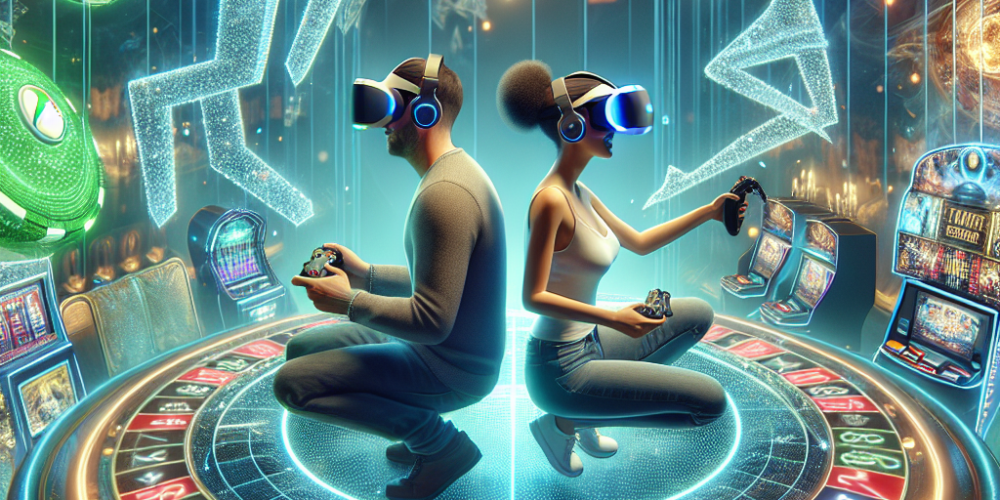In an era where digital experiences continue to shape and redefine the entertainment landscape, a significant shift has been observed within the realm of gaming and casinos. Particularly noteworthy is the burgeoning integration of virtual reality (VR) technology in casino games on popular console platforms such as Xbox and PlayStation. This innovation is not only redefining user engagement but also broadening the horizons for the gaming industry itself.
The inception of VR technology in gaming was primarily focused on enhancing the video gaming experience—offering users an immersive environment that blurred the lines between the virtual and real world. However, the application of this technology has rapidly expanded to include casino gaming, a sector that has traditionally thrived on the vibrant, bustling atmosphere of physical casinos. Today, console giants like Xbox and PlayStation are tapping into this market, transforming how players interact with casino games and, in essence, how they gamble.
The Draw of VR Casinos
VR casinos on these platforms offer a myriad of games including blackjack, poker, slots, and roulette, all designed to give the player a life-like experience. Through the use of VR headsets and compatible controllers, players can walk around virtual casinos, interact with other players, and engage in games as if they were at a physical location. This level of interaction is not just about gambling; it’s about creating an entire social experience. Players can pick up cues from their opponents, socialize, and even interpret body language, making the virtual gambling experience incredibly realistic.
What This Means for Traditional Gaming
For traditional gaming sectors, particularly land-based casinos, the rise of VR casinos represents both a challenge and an opportunity. On one hand, VR casinos offer convenience and innovation, attracting a demographic that might not have previously been interested in visiting a physical casino. On the other hand, they present a competitive threat that could potentially divert gamblers away from traditional casino floors.
However, many traditional casinos are viewing this technological advancement as a cue to innovate. Rather than viewing VR as a threat, some are embracing it, offering virtual tours and hybrid experiences that combine both the physical and virtual worlds. By integrating VR, traditional casinos are not only enhancing the customer experience but also reaching out to a global audience, breaking geographical and physical limitations.
Growth and Future Projections
The market for VR in gaming is expected to grow exponentially. According to a recent market analysis, the VR gaming market size was valued at several billions of dollars as of 2021 and is projected to register a compound annual growth rate (CAGR) significantly higher from 2021 to 2028. This growth is partly due to the increasing availability of affordable VR devices and the wider adoption of VR technology among mainstream tech consumers.
Console developers are continuously improving their VR offerings, with both Xbox and PlayStation committing to more immersive and high-quality VR gaming experiences. This includes not only enhancing the graphical fidelity and user interface of VR casino games but also ensuring that these platforms are secure and promote responsible gambling.
The Role of Developers and Regulators
With the growth of VR casinos, game developers and regulatory bodies are faced with new challenges and responsibilities. Ensuring fair play, preventing addiction, and protecting user data in a VR environment are top priorities. Developers are tasked with creating secure, fair, and engaging content that adheres to the stringent regulations that govern gambling and digital privacy.
In conclusion, as VR technology becomes more sophisticated and accessible, virtual reality casinos on Xbox and PlayStation are setting new standards in the gaming and gambling industries. These platforms not only offer a new way for players to engage with casino games but also create opportunities for traditional casinos to innovate and adapt to new digital trends. The future of VR in gaming looks promising, and as it continues to evolve, it will undoubtedly continue to transform the landscape of leisure and entertainment.

Karine Gomez is an enthusiastic writer and avid gamer with a particular love for PlayStation and casino gaming. Her deep knowledge of gaming trends and casino dynamics makes her articles both informative and engaging. Karine’s passion for PlayStation games and her firsthand experience with casino play shine through in her writing, offering readers authentic insights and valuable tips.

